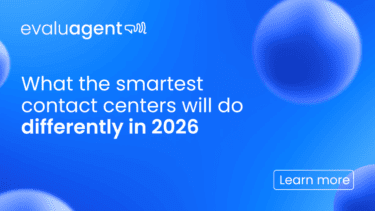8 things the smartest contact centers will do differently in 2026


Our third annual Contact Centre Performance Summit brought together leaders, innovators, and practitioners from across the CX industry – all exploring one question: How can contact centers drive performance, trust, and customer satisfaction while so much is changing?
Across six insightful sessions, speakers shared bold ideas and practical lessons on quality, empathy, technology, and leadership. Here are 8 of the most important insights that show the direction of travel for next year.
As Jaime Scott reminded us in his opening keynote, the success of customer experience isn’t built on technology – it’s built on trust. And trust depends on quality.
That means delivering on promises, supporting customers in the moment, and consistently meeting expectations – and there’s only one way you can ensure you’re doing all of that. Quality management, far from being a tick-box exercise, is finally starting to be seen by leaders as the strategic pillar of CX that it really is.
“AI, while it’s technology, gives us the opportunity to fulfill what we are as humans.”
In her energetic session, Sandra Thompson flipped the narrative: empathy isn’t being replaced by AI. It’s being enhanced by it.
In fact, AI can help us busy humans predict frustration, prompt better timing, and personalize communication. It works best when empathy is designed into systems and processes from the very start.
The most successful contact centers will use technology to free humans to do what they do best: connect emotionally and build trust.
“One fix could mean hundreds of thousands of dollars saved,” said Jaime Scott. “QA at that point is not just quality assurance, but quality intelligence. A driver of decisions, not just in the contact center, but across the whole business.”
And it’s not so hard to see why. Next-generation quality management connects contact center insight with business outcomes. QA is no longer about checking whether agents followed a script. The real value is in understanding where your customers experience friction and frustration, and which parts of your product or process are falling down.
Sophie Cotton, Chief Customer Officer at Newstel echoed Jaime’s point in her interview with evaluagent Chief of Staff Michelle Dinsmore: “QA [insights] allows every department to make decisions that are really informed, but also empathetic, and it weaves all those stories together.”
But there’s another story not being told around employee engagement. Sophie highlighted that when QA stops being seen as a ‘fear’ and more as a tool to drive change – not just on agent performance but in other departments too – agents learn that their observations matter. They feed into tangible outcomes, and can see things changing.
In Nerys Corfield and Matt Jones’ session ‘Decluttering your data’, they emphasized something that often gets lost when we talk about metrics.
Collecting customer and performance data has become easy; the hard part is mobilizing it. Many contact centers drown in dashboards, but fail to connect insights to day-to-day decisions
Nerys elaborated, explaining that execution often beats information. She invited attendees to ask themselves: “Does this metric impact the customer experience and or the advisor experience positively? Then keep them, keep measuring them. If it doesn’t, that’s when it really needs due thought and consideration.”
Strategically, the winning organizations will be those that treat data as a living system that’s subject to tweaks and changes, not just a report.
“Customer satisfaction has been consistently low for 10 or so years – at the same time, we’ve never had better technology. I truly believe it’s because we are not investing in our leaders. Building that culture of growth and progress doesn’t happen by osmosis alone.”
Martin Teasdale, Founder of the Team Leader Community, highlighted a great point: one of the best ways to improve performance and engagement is to equip your team leaders to lead well.
Many of the live chat participants echoed Martin’s sentiments, sharing that when they became Team Leaders, they were offered no additional support or training. So in a world where change is the only constant, you need to provide development pathways, mentoring, and recognition – not just expect them to figure it out.
When leaders feel valued and capable, their teams reflect that energy back to customers. That creates a magic ripple effect: agents are engaged and improving, all because leadership is consistent.
Callan Schebella, Board Advisor to evaluagent and CX entrepreneur, closed out the conference with some real food for thought around AI.
Just because AI can do a job well – and your customers engage with it – does not mean people like AI. But if the choice is waiting for a contact center’s phone lines to open again on Monday, or trying to get an answer quicker from a bot, most people will give the bot a chance.
Even so, Callan shared a startling statistic that 48% of consumers do not trust information from an AI-powered service bot – and 75% still prefer to talk to a human.
“This is going to be a big challenge for the industry,” said Callan. “I can imagine there’s going to be a number of companies out there looking at ways to solve this trust issue.”
With talks on metrics, leadership, empathy, and AI, the Summit covered a lot of ground on the state of play as we head towards 2026.
And ultimately, the general feeling is optimistic: the most successful contact centers of the future will blend digital precision with human authenticity.
AI can enhance consistency and efficiency, but human connection and creativity will be what makes experiences memorable and cuts through the noise. Technology might transform the tools we use, but people will always define the experience.

Missed the 2025 Summit? Or simply want to revisit some of the great insights from the day? You can access all the recordings right here.
Access all recordings